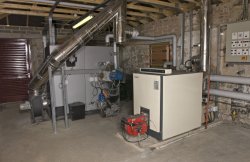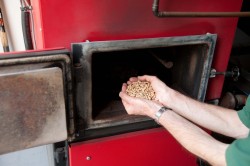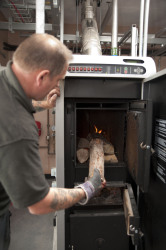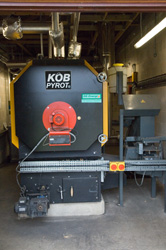 System suitability and fuel supply, storage and delivery are important issues that must be considered. There are also a number of regulations relating to the installation of solid fuel heating systems that apply to biomass systems.
System suitability and fuel supply, storage and delivery are important issues that must be considered. There are also a number of regulations relating to the installation of solid fuel heating systems that apply to biomass systems.
Before installing a biomass energy system there are a number of considerations that should always be made:
There are a number of regulations relating to the installation of solid fuel heating systems that apply to biomass systems. Many are derived from those originally drawn up for coal and smokeless fuel systems and may be imperfectly suited for modern biomass systems, which can cause difficulties.
These include:
There are a number of different options for having a biomass system installed. These include:
For efficient, low emission combustion biomass needs to be burned fast, at a high temperature.
Does the system need to provide continuous, low level output?
Although most modern wood chip and wood pellet boilers are designed to allow modulation of the output down to perhaps 30% of maximum output, biomass is not well suited to this mode of operation and if continuous, low level output is routinely required biomass may not be the optimum choice. This also means that it is very important not to over specify biomass boilers.
Handling requirements for seasonal variations
Where seasonal operation varies between high level output for winter heating and low level output for summer hot water, a biomass boiler supplemented by a small gas boiler might offer a suitable combination. This may also allow the biomass boiler to be specified for commonly required maximum output, using the supplementary boiler to meet peak demand required for just the few coldest days of the year as well as summer hot water.
Achieving optimum firing
One way to allow optimum firing is to use an accumulator which allows the boiler to operate at maximum output to heat a large reservoir of water that is stored in an insulated container until required.
Whenever a biomass installation is planned the intended sources of fuel should always be included in the planning and the equipment specified accordingly.
If wood chips available
Where there is access to significant resources of seasoned timber residues, recycled timber or a mature local woodfuel supply chain that can readily supply wood chips at 35% moisture content or below, then specifying a suitable boiler that burns low moisture content fuel can mean:
If small round wood (SRW)or arboricultural arisings available
Alternatively, if space exists to air dry timber such as SRW, and there is the facility to chip it on site, this may be the optimum choice.
If, however, the system is intended to use arboricultural arisings from local tree surgeons, which will be delivered green and freshly chipped, then the best choice may be to choose a combustion system that is designed to burn green material and recoup the additional cost of the system in lower fuel and storage costs.
Further information about biomass fuels:
Good design of the biomass fuel store, considering delivery and extraction of the fuel, as well as access for maintenance, is very important to efficient, smooth operation of a biomass installation.
Storage
Biomass is a low energy density fuel, and consequently a large volume must be stored on site if unacceptable frequency of deliveries is to be avoided, and sufficient reserve safety margin maintained. There must therefore be a suitable area, sufficiently close to the intended site of the combustion equipment to avoid an unacceptably long fuel feed, creating increased risk of blockages or difficulties, and also accessible to the intended delivery vehicles.
Delivery
The intended delivery method should also be considered. If wood chips are to be delivered by tipper truck, the most efficient method is to tip them directly into the fuel store. This may require a ramp to allow the lorry to back up to the lip of the store, or a fully or semi-underground store.
If wood is to be chipped on site, however, it may be possible to chip directly into an above ground store.

Pellets offer a clean, free flowing, relatively high energy density fuel that can be conveniently delivered by tanker via a long hose.
Pellets offer a great deal of convenience compared to other types of biomass fuel. Buildings using pellet boilers often have their fuel delivered by lorries (similar in appearance to an oil tanker) able blow fuel directly into a store. Smaller appliances, such as stoves with integral fuel hoppers, may be better served by bags containing 10 to 25 kg of fuel. Compared with logs and chips, pellets have a high energy density which means that less storage space is required. Pellet systems are often physically smaller than their log and woodchip counterparts.
Pellet stoves fulfil a similar role to their log fired counterparts. They are available in a range of sizes from small room heaters to larger units incorporating a boiler able to supply heat to a few radiators or a domestic hot water systems. They usually have an integrated fuel hopper which is filled from a bag. Pellet stoves are available from room heaters of 1.5 to 2 kW up to around 12 kW, above this size a boiler is more appropriate (see below). Some are equipped with timers, remote controls or even systems using text messages to start and stop operation to ensure you always come home to a warm room.
Things you should know
Pellet boilers tend to be physically smaller than chip fired equivalents as less robust feed and burning systems are needed. Installations are available from around 15kW upwards, there is no significant technological upper limit to installation size (there are a number of power stations in Europe that run exclusively on pellets).
Pellet boilers are available with either a built-in hopper, filled manually from bags, or with a separate, bulk storage hopper. The latter allows pellets to be delivered by tanker, down a long pipe, typically just once a year, with the minimum of disruption. Buying in bulk is also cheaper, provided a minimum order size can be achieved, but the additional cost of a bulk hopper, and pellet feed to the boiler may not be justified.
It is very important to ensure that pellet fuel stores are well sealed and do not allow dust to enter the boiler room or other parts of the building. Guidance on designing a fuel store is available (PDF -2.6 MB), and there is more information in the pellet stores section
Things you should know

Logs are a well established traditional fuel. They can be burned in conventional stoves or in more sophisticated boilers.
Stoves are a widely available, simple technology. They are considerably more fuel efficient than open fires, and can be found in a wide variety of different shapes, sizes and designs. If you are keen to heat your house with woodfuel on a limited budget this is probably the cheapest option. Even if you only use a stove instead of your normal heating method for two weeks at either end of your heating season, you are still making an important contribution.
Things you should know
Log fired boilers are a logical step up from stoves. They range from systems designed for hot air space heating to be used in workshops, run on off-cuts, to boilers designed to run domestic heating and hot water. While some systems are at the basic, simple end of the market, employing robust, reliable technology, some boiler systems are highly efficient, with sophisticated controllers offering the option of zoned heating.
Things you should know

Woodchip fuel is suited to larger scale systems, and can be particularly useful on sites that include areas of woodland.
Wood chip boilers are most appropriate for medium and large scale installations. Buildings that currently use wood chip boilers include blocks of flats, visitors centres, office buildings and even airport terminals. It is very important to ensure that wood chip boilers are supplied with the appropriate type of fuel. This will vary between boiler types and sizes. The two most important variables are particle size and moisture content. Wood chips that are too large or too wet for example, can jam the fuel feed system, reduce the efficiency and reliability of the boiler or cause the control system to trip out. More information about fuel standards can be found here.
Wood chips can be produced from round wood by using specialised wood chippers. These are designed to produce a uniform size of chip that works well in automated fuel feed systems. There are many wood chip suppliers around the country, alternatively if the boiler is going to be installed on a farm or other site with its own woodland it may be possible to use this resource to provide at least part of the fuel requirement. The use of a specialist, contract chipper service can avoid the need to buy a chipper.
Since wood chips require less processing than pellets and less manual handling than logs, they can be an extremely energy-efficient use of biomass. Country estates, farms and other sites where there is woodland near to the point of end use are particularly well suited to wood chip systems. Many of these sites also find that they are able to offset forestry and heating costs within the organisation.
Things you should know
These include suppliers of systems that also handle their installation and may also supply the fuel and energy supply companies (ESCOs) that contracts to supply heat and may install, own and maintain the boiler
These supply and install a system. They may include a service contract to provide maintenance support, may sub-contract to local engineers, or may leave it as the responsibility of the purchaser. The user is then responsible for ensuring adequate supplies of suitable quality fuel. If inappropriate fuel is used which causes difficulties or a failure this can lead to disagreements over responsibility
Not only do these supply and install the system, but also undertake to supply the fuel. This offers the purchaser confidence that suitable fuel will always be available, and also allows the installer to ensure that only suitable fuel is used, thus minimizing the chances for fuel related failure. This cuts down on warranty repairs and helps ensure satisfied customers
Instead of supplying a boiler or fuel to the end user, an ESCO contracts to supply heat. The ESCO may install, own and maintain the boiler, or may sub-contract some or all of these, however it is responsible for ensuring heat is always available as required.
Contracts will usually contain a penalty clause if heat becomes unavailable for whatever reason.
Heat used is usually metered on the basis of hot water flow rate and the temperature difference between delivery and return temperature.
Because fuel supply is decoupled from heat supply the ESCO is free to choose the optimum combination of fuel based on calorific value, price and availability, and can negotiate for a reliable supply, potentially working with a number of suppliers.
The ESCO will also be responsible for ensuring any maintenance takes place as required and any faults or failures are rectified as soon as possible to avoid penalty payments.
The ESCO model effectively allows the final user to be ignorant of any practical details of the heating system, including the fact that it uses biomass fuel. It is particularly suited to installations where multiple units are supplied from a single boiler, such as district heating, site or large building installations